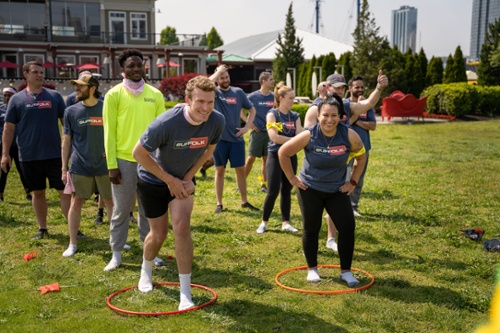Is your company looking for a new, creative way to get employees out of the office? Look no further than a ZogCulture City Scavenger Hunt!
Read MoreGet a Glimpse of a ZogCulture City Scavenger Hunt
Topics: Play, Team Building, Play at Work, Connection, Company Culture, field day, outdoor events
Ways to Celebrate Hispanic Heritage Month in the Workplace
Hispanic Heritage Month is a month-long celebration beginning September 15 and an opportunity to celebrate the diverse culture, rich history, and contributions made by Americans whose ancestors came from Spain, Mexico, the Caribbean and Central and South America.
Looking for ways to celebrate? We're here to help! Take some time as a company to connect and learn through one of these event ideas.
Read MoreTopics: Play, Team Building, Play at Work, Connection, Culture, Company Culture, diversity and inclusion, Employee Appreciation
5 Opportunities for 52 Connections
Last week, we shared a post about one of our most popular events, 52 Connections.
After running hundreds of 52 Connections events, we’ve learned a thing or two about how our playful prompts can create meaningful connections for the right audience.
Read MoreTopics: Hiring, Connection, company events, Games, Activities, virtual company events, 52 connections, interns
Tell Me More: 52 Connections
You're hiring and want to make it less awkward for new employees to get to know their colleagues. Plus, you have coworkers who have been acquainted for years but don't really have a tight bond. We get it!
That's why we developed 52 Connections, our connection-building event for coworkers to get to know one another in a relaxed setting.
Read MoreTopics: Hiring, Connection, company events, Games, Activities, virtual company events, 52 connections, interns
Build Better Relationships with Your Colleagues with These 3 Tips
Think back to when you first started at your job. You were probably nervous, not just about the workload, but about how you'd fit in with the people you work with. Whether working remotely or in the same workplace, those relationships are important to feeling accepted, and feeling like a real member of the team.
No, you don't have to be best friends with everyone you work with, but it is very important that colleagues know each other beyond just the work you do. We've got 3 great tips to help your team connect more smoothly and easily.
Read MoreTopics: Team Building, Connection, virtual company events
52 Connections: It's Like Speed Dating, but for Work Friends
Since publishing this post in 2021, 52 Connections has been played by thousands of participants at hundreds of companies. It has become ZogCulture's signature speed networking game. Learn more about in-person and virtual options.
Have you ever wondered how to make it less awkward to get to know your colleagues? Whether colleagues who have been acquainted for years but don't really have a tight bond or a class of new hires, there must be a way to make this process easier and more fun. Right?
Abso-freaking-lutely! So we thought about it and created something fun, fast, and friendly. It's called 52 Connections. Trust us, you're going to want to grab our deck of cards and start playing.
Read MoreTopics: Connection, company events, Games, Activities, virtual company events
Best ideas for team-building activities for remote workers
With the latest advice from the coronavirus task force to limit gathering to groups with 10 or fewer, many companies across the country have decided to implement teleworking policies to prevent the spread of COVID-19. Whether your company always works remotely or is doing so temporarily, there are very real benefits gained from offering this flexibility to employees.
But it does take some forethought to build or maintain a team when you're not physically in the same place.
Read MoreTopics: Team, Team Building, Connection, Games, Remote Working, Working Remotely, coronavirus
How do you keep your company culture intact in the time of coronavirus?
Many companies have already implemented policies, communications, and contingencies for how they will operate during the current public health issue of the coronavirus (COVID-19). And while there is no way to overstate how important those preparations are, there's another hugely important thing for companies to consider:
Read MoreTopics: Connection, Company Culture, Leadership, coronavirus
Working Remotely Done Right, Part 1: 6 engaging ways to keep your team connected
When all 25 New York City-based team members of the ZogLife office worked remotely for nearly two months while their workspace underwent a refresh, the team used it as an opportunity to experiment.
Read MoreTopics: Office Culture, Play, Team, Team Building, Productivity, Ideas, Employee Engagement, Connection, Employee Experience, Company Culture, Leadership, Goals, Tips, Fun, Working Remotely
It’s Not Magic: Tips to Get EVERYONE Playing at your next company event!
The experts have spoken: Play is more than just fun and games. But as HR professionals and people leaders, how can we be strategic in using play to engage your coworkers? How can we design experiences that make employees excited to raise their hand and jump in the game?
Read MoreTopics: Office Culture, Play, Team Building, Event Planning, Play at Work, Corporate Event Planning, Company Retreats, Ideas, Employee Engagement, Fun at Work, Connection, Culture, Employee Experience, Company Culture, Tips, Human Resources, diversity and inclusion, company events, Employee Appreciation, Fun, Play Personalities, Stuart Brown
The 8 Play Personalities that illustrate how we have fun
Looking to host an incredible in-person or virtual event for your company? Look no further than ZogCulture, the experts in play at work.
Let’s get one thing straight: Play isn’t just kid stuff. There’s a science to how we play, and it affects our lives in important ways—from how we work to what we find fulfilling. In fact, some social scientists suggest play might be the most important work we do.
Topics: Office Culture, Play, Play at Work, Reflections, Fun at Work, Connection, Culture, Company Culture, Skills, Fun, Play Personalities, Stuart Brown
8 Ways March Madness Promotes Healthy Company Culture
Topics: Office Culture, Play, Team, Play at Work, Work Life Balance, Fun at Work, Work Culture, Connection, Culture, Employee Experience, Community, Company, Company Culture, Sports, Tips, Games, March Madness, Basketball, NCAA Tournament
Leaders In Play: Meet Amanda Delaney, Blend's EX Extraordinaire
Welcome to Leaders In Play! We interview people who take having FUN at work very seriously. We know, it seems like a crazy concept, but incorporating Play At Work has been proven to improve employee engagement, creativity, recruitment, retention, and provide countless other benefits that help create healthy company culture. Read on to learn more about our featured leader and their definition of Play, both in and out of the workplace.
Read MoreTopics: Office Culture, Event Planning, Play at Work, Work Culture, Connection, Culture, Employee Experience, Company, Company Culture, Leadership, Human Resources, company events, Employee Recognition, Games, Interview, Leaders In Play
Spread love, it's the culture way: How to playfully express gratitude in the office
Since originally publishing this post in 2019, ZogCulture has hosted hundreds of company events across the country. Learn more about our in-person and virtual options!
As a kid, did you buy those pharmacy-branded Valentine’s Day Cards with cheesy sayings like “Just speeding by with Valentine 'Hi'”?
Read MoreTopics: Office Culture, Team Building, Holiday, Gratitude, Connection, Culture, Employee Experience, Company, Company Culture, Core Values, Tips, Human Resources, Games, Valentine's Day, Love
A thank you to our incredible women on National Girls & Women in Sports Day
I don’t usually care much for these designated holidays. But National Girls & Women in Sports Day? You got me there. I’ll play.
Read MoreTopics: Play, Reflections, Gratitude, Connection, Community, Core Values, Sports, Women, Empowerment

.jpg)













-1-1.jpg)
